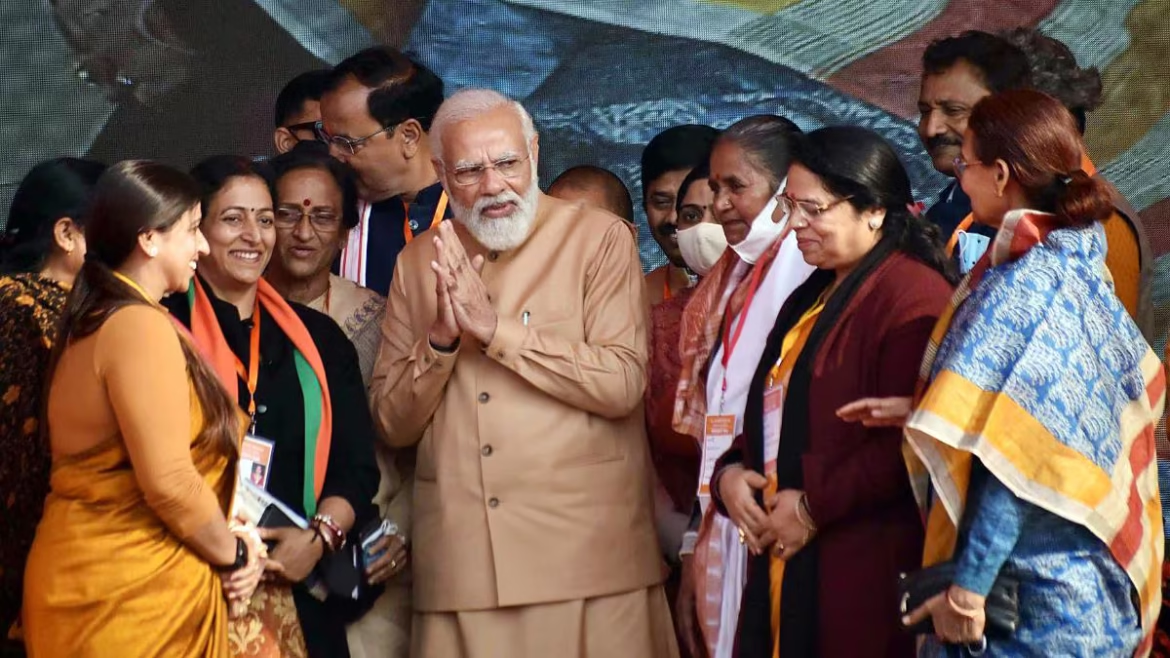New Delhi, 16 January 2025- A cash-for-women assistance program along the other programs already in place in other BJP-ruled states is likely to be announced by the BJP in its manifesto in an attempt to challenge the ruling Aam Aadmi Party (AAP) in Delhi in the February 5 Assembly elections.
Additionally, the BJP would probably pledge to provide senior citizens and male students with free bus transportation.
“The free bus scheme will have no age restrictions for male students. Anyone from a four-year-old kindergarten student to a 40-year-old PhD scholar can avail it just by furnishing their identity card. Currently, the scheme is applicable only to women students and expanding its ambit will help us attract voters,” a senior BJP leader, who is a part of the election manifesto committee, said adding that the scheme will benefit lakhs of students. For senior citizens, the leader said, every citizen above the age of 60 would be eligible for it.
By offering women a monthly financial aid package of between Rs 2,500 and Rs 3,000, the BJP hopes to duplicate the success of the Ladli Behna Yojana in Madhya Pradesh and the Ladki Bahin Yojana in Maharashtra in Delhi.

BJP plans to bring male centric schemes in Delhi along with women- welfare programs if voted to power
According to sources, during their campaigns, BJP leaders will point out the achievements of similar schemes in other states where the party is in power while accusing the AAP of not implementing them in Delhi and Punjab, the two states where AAP is in power. “Once the manifesto is announced, we will only step up our efforts to make this a bigger issue,” a leader stated.
In addition to expanding the fleet of CNG and electric buses, another BJP leader stated that other current programs, such as university special buses and woman-only buses, would be renewed to guarantee safe transportation.
According to BJP insiders, the “sankalp patra,” or party manifesto, which is anticipated to be unveiled in the coming days, would also ensure that the current welfare and subsidy programs, such as 200 units of free electricity, free water, and free transportation for women, would either be maintained or improved. For example, the party is expected to pledge up to 500 free power units for religious places and up to 300 free electricity units for households.
Other proposals likely to feature in the manifesto include “jaha jhuggi, waha makaan”, a solar policy akin to the central one, cleaning up of Yamuna within a year, and razing of the “kooda pahads (mountains of garbage)”.
Prime Minister Narendra Modi, recently emphasized in a rally in Delhi that if the BJP forms the government in Delhi, programs like free electricity, free public bus travel for women, and healthcare programs, among others, will continue.
Women have also been the focus of other significant parties involved in the conflict. Under the AAP’s Mahila Samman Yojana, women receive Rs 1,000 per month in assistance; if his party is re-elected, party chief Arvind Kejriwal has pledged to raise this amount to Rs 2,100 per month. The Congress also unveiled its Pyari Behna Yojana, which calls for the party to provide women with Rs 2,500 in aid each month.
Regarding other welfare programs, the AAP has pledged free water, Ambedkar scholarships for Dalit students, free healthcare for all senior citizens, and a monthly payment of Rs 18,000 to granthis in gurudwaras and priests in temples. For all Delhi residents, the Congress has promised free health insurance worth Rs 25 lakh and free electricity up to 400 units.
The BJP had previously condemned the “revdi culture” and attacked its rivals for their “freebies.” In light of the enormous electoral significance of Delhi’s poor and disenfranchised, who appear to favor the AAP due to its programs among other reasons, the party is now prepared to put forth a number of welfare initiatives.

